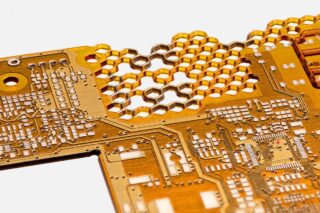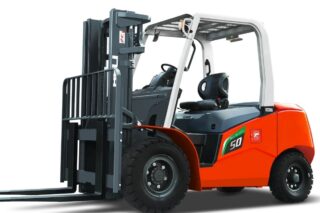Last Saturday, CES 2024 closed its doors after a successful and busy edition, with more than 4000 exhibitors participating and more than 135.000 attendees from over 150 countries. While the acronym CES, short for Consumer Electronics Show, might suggest a strong focus on consumer-oriented products and services, the event has moved more and more towards showing innovations relevant to B2B and the industrial sector.
In an interview just before the start of the show, CTA Senior Vice President Kinsey Fabrizio confirmed this trend:
“Many people think that, because of our name, only consumer products are exhibited here at the show. But just a look at who’s holding a keynote: Siemens, Intel, Hyundai, Qualcomm, Panasonic, Abbot, and many more. We’re so much more than direct-to-consumer, and it shows with the amount of enterprise tech and innovation you can find on the show floor”.

1400+ Startups
The trend is particularly clear at Eureka Park, the CES hall dedicated to startups, scale-ups, and innovative companies. The space hosted more than 1400 exhibitors from all over the world. While many focused on consumer innovation, many others showed their B2B products and services focus on solving problems for enterprise and industrial customers.
France brought about 140 startups and innovative companies to Las Vegas. The French delegation, sponsored by Business France, Choose France, and La French Tech, is a public-led effort to help the ecosystem of French Startups thrive and flourish, both locally and abroad.
Romain Gaillac, Project chief for IoT and Hardware at Business France, told DirectIndustry that the Las Vegas show represents a unique opportunity for the country’s innovation network:
“For the French Government, it is really important to be at CES to show its support to our startup ecosystem and help companies develop their international relationship, showing their innovations. The companies we brought here cover various fields, from cybersecurity to Green Tech, AI to Mobility, and more”.
Walking through the French Pavillion aisles at Eureka Park, we felt the mission was accomplished. Not all ideas we encountered were equally groundbreaking, and we already knew some products and startups from previous shows like IFA.
Nonetheless, we came away from our visit feeling that the French ecosystem is doing a great job at supporting and pushing forward many startups tackling deep-tech and industrial problems with innovative and original solutions.
Among those we discovered in Las Vegas, we picked 8 companies worth watching in four macro-areas: Logistics, Cybersecurity and Cloud, Greentech, and Industry 4.0.
Logistics
1/ Idyllic
We discovered Idyllic at CES Unveiled even before the show began. The company developed a radio-frequency tag that could be an alternative to the barcode and RFID tags. The system is based on a receiver that can scan many tags at once by interpreting each unique frequency response, thus immediately checking the presence and localizing many items in a matter of seconds. The technology could prove useful in stores and large industrial warehouses for speeding up the inventory of parts, vehicles, and other property.
2/ Ex9
Ex9 unveiled at CES a new all-in-one automated transport solution for logistics and manufacturing terminals. The company’s fleet of autonomous electric robots makes it easy for large companies to automate logistics operations without the overhead of investing in an in-house tech solution. Thanks to computer vision and AI, the robots can always know where they are in a terminal, identifying the dock doors or trailers from where they must pick up or deliver cargo. On top of the cost-saving advantage, Ex9’s solution is also much more environmentally friendly, with a 94% reduction in emissions compared to traditional diesel yard tractors.
Cybersecurity & Cloud
3/ Akidaia
Securing access to remote industrial sites where internet connection would cost too much to install is a tricky problem. Nice-based Akidaia came up with a decentralized solution that, thanks to a patented technology, allows the distribution of access rights to smartphones, which can then be used as unique access identifiers in situ. Akidaia’s solution is easy to install and works without storing data locally, thus avoiding the risk of tampering and data leaks.
4/ Leviia
Due to the impositions of GDPR, companies that provide their cloud services in Europe and work with sensitive data need to be extra careful when using cloud solutions from Amazon, Google, and other big American providers. Leviaa offers cloud solutions that put privacy first and are guaranteed to be EU sovereign, with data always hosted only in France. The servers used by the company are also run by 78% renewable energy, to reach 100% by 2025.
GreenTech
5/ Molluscan
As the name vaguely suggests, Molluscan developed a technology to use bivalve mollusks as connected biosensors to measure water quality.
The system employs oysters, mussels, and scallops to let companies measure the impact of their activities and waste disposal on the surrounding aquatic environment. Using mollusks instead of chemical sensors can reduce monitoring costs and does not require human intervention once deployed.
6/ EHM – Efficient Hydrogen Motors
While many companies focus on fuel cells as the base for a hydrogen-based disruption in the automotive sector, this startup from Brittany is trying to revive the old concept of a hydrogen combustion motor with a contemporary engineering twist. According to the company, the EHM solution has the potential to revolutionize the heavy-duty transport sector thanks to a newly developed zero-emission engine that can substitute diesel motors in large trucks and lorries. A first experimental batch of hydrogen-motor trucks will be tested with logistics giant Schiever.
Industry 4.0
7/ Ewattch
The Lora and LoRaWAN long-range wireless technology is promising for deploying IoT solutions quickly and effectively. Ewattch has developed a series of solutions based on the standard that can help companies digitize and connect industrial sites rapidly and cost-effectively, either gradually or all at once. Ewattch’s systems are also suitable for smart building applications to quickly connect and monitor electrical panels, lighting, heating, ventilation, and more.
8/ DeepHawk
DeepHawk develops a next-generation AI system that can enhance the performance of visual quality control in many industrial settings. The company’s model is compatible with any type of industrial analysis camera (optical, X-ray, infrared, or microscopic) and can detect anomalies within 15 milliseconds for any kind of product or item.











